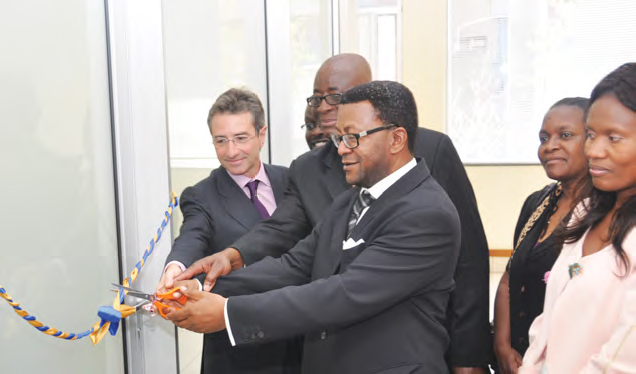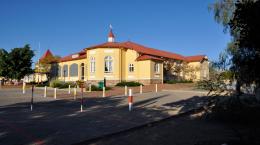Polytechnic leads international scheme

The Polytechnic this week reached another milestone in its internationalisation strategy when it launched the Intra-African-Caribbean and Pacific Academic Mobility Scheme (Intra-ACP) on campus.
The EU-funded scheme (at €2.291 million) provides support to higher education institutions within the ACP regions by setting up inter-institutional cooperation partnerships with each other.
According to Lameck Mwewa, Dean of the School of Natural Resources and Tourism at the Polytechnic, the programme will provide access to higher education for students, staff and academics from member institutions and other African nationals, thereby enabling them to benefit linguistically, culturally and professionally from experience gained in the context of mobility to another country.
“The project will also strengthen African higher education through academic mobility, as it promotes cooperation between higher education institutions,” he said.
The partner universities in the Polytechnic’s consortium are Ardhi University (Tanzania), University of Buea (Cameroon), Hawassa University (Ethiopia), Makerere University (Uganda), Kwame Nkrumah University of Science and Technology (KNUST, Ghana), North-West University (South Africa) and the University of Free State (South Africa). Two European universities are technical partners: University of Twente (ITC) Faculty (Netherlands), and the Justus Liebig University Giessen (Germany).
The Rector of the Polytechnic, Dr. Tjama Tjivikua, said the partner universities in the consortium were chosen based on a thorough analysis of their academic strengths and the diversity of postgraduate studies which they offer. Only three of the 33 consortium applications are funded in this highly competitive process.
“With these partners on board, we are determined to meet the expectations of our funding agency, the European Union, to strengthen inter-institutional collaboration to make way for quality higher education collaboration,” the Rector said, as he announced that the European Union, through its European Development Funds, funds the scheme with 2.291 million Euros.
Tjivikua, emphasising the benefits of the project to the country and its citizens, said that in order for a country to become a knowledge based economy, it needs highly qualified people who can drive innovation in science and technology through research and development.
He added that the programme will provide Namibians with an opportunity to increase their qualifications, thereby contributing to the building of highly qualified and skilled human capital needed to drive the country’s development agenda as outlined in Vision 2030.
On the individual level, he said, the programme will grant an opportunity to those talented individuals who may not have access to funding to pursue their dreams further after completing their undergraduate studies.
Students, doctoral candidates, teachers, researchers and academic staff are encouraged to apply for the programme follows the EU tradition to develop higher education to study in any intra-ACP mobility partner institution, so that they can advance their intellectual competencies. The fileds of study are: Agricultural Science, Education Teacher Training, Engineering Technology, Medical Science, Natural Sciences, Communication and Information Science.
The exchange programme will encourage the exchange of knowledge, skills and experiences among partner universities through its comprehensive scholarships. “This can include cultural exchanges and cross-fertilisation of knowledge, thereby giving students a rich learning experience,” he said.
The National Qualification Authority will play an advisory role in creating a comprehensive credit recognition and transfer system among the Polytechnic’s partners and in assessing foreign qualifications to ensure their quality is not compromised, while the University of Twente, in the Netherlands, will provide technical support. Raul Fuentes-Milani, the European Union Ambassador to Namibia, said the programme follows the EU tradition to develop Higher Education and will enhance the political, cultural, educational and economic links between the participating countries.



